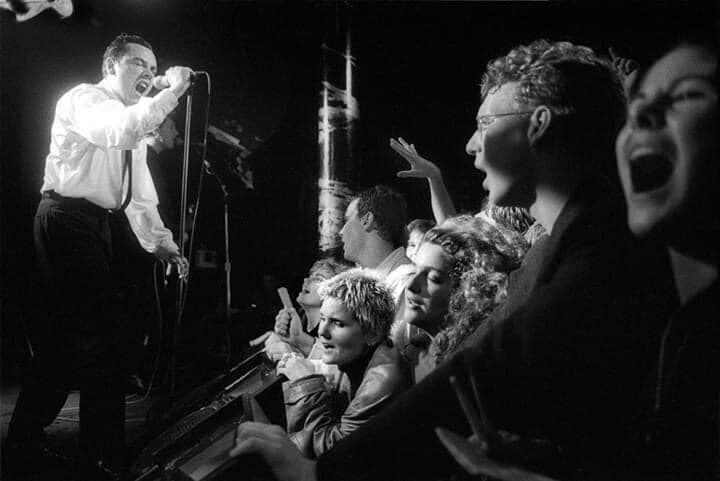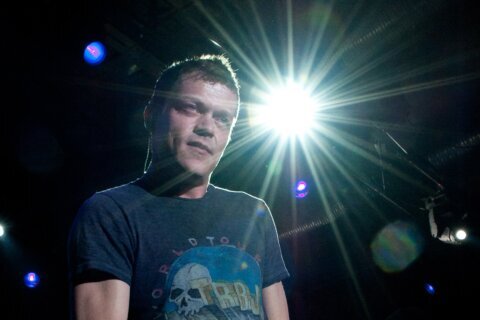This video is no longer available.
Great moments in live rock ’n’ roll shows that have been burned into music fans’ minds can often become distorted over time, yet Peter Coyne, the singer of The Godfathers, recently confirmed one of my great 9:30 Club memories.
It was March 1988, weeks after the British band released their “Birth, School, Work, Death” album. In my mind’s eye, I could picture The Godfathers storming on-stage at the old 9:30 Club, amid a cloud of still-legal-cigarette-smoke, and ripping into their first number.
“As we went on stage, I’d be smoking a cigarette,” Coyne tells WTOP, 35 years after that show. “Of course I was.”
Now, for the first time, Coyne is describing how his three- and four-pack-a-day habit took hold — and why he decided to stop.
With a name like The Godfathers, and an image of young, well-dressed toughs — fronted by Coyne, with his perpetual snarl — several early publicity photos of Coyne included him with a cigarette to his lips.
“I had my first cigarette when I was about eight or nine years old,” Coyne said. “My dad wasn’t a smoker, but he used to like a smoke when he had a drink, down the pub.”
“It was an Irish cigarette, called a Sweet Afton,” made with tobacco from Virginia. “It was no tip, totally unfiltered, I just smoked it and thought, ‘Oh, I don’t like that.”
Growing up in the 1960s and 1970s, Coyne had plenty of inspiration in common culture to become a “real” smoker.
“I was watching films, with people like James Dean or Humphrey Bogart, they always had a cigarette on the go,” said Coyne. “I used to think it was the coolest thing, watching Humphrey Bogart rolling up a cigarette, and then popping it in his mouth, and bustin’ the case.”
As rock ‘n’ roll morphed into punk, Rolling Stones guitarist Keith Richards lit another, and Cheap Trick drummer Bun E. Carlos played himself into a smoky haze, with a cigarette dangling from his lips.
Like a lot of people, Coyne started smoking as a crutch: “I was quite an awkward sort of person, really — quite shy,” belying his stage persona of a hood ready to belt someone in the chops.
“It was something to do with your hands, and something the youth thought was cool to do,” said Coyne.
It wasn’t until 1969 that Congress required each cigarette package to display a label “Warning: The Surgeon General has determined that cigarette smoking is dangerous to your health.”
Coyne grew up in South London.
“Everybody was doing it at the time,” said Coyne. “I used to go to the doctor, and the doctor would be smoking a cigarette, with an ashtray full of butts that he’d smoked that morning — it was very, very, very different times.”

‘I could just feel something was wrong with me’
By the time The Godfathers were percolating as the next big thing in the late 1980s, Coyne wouldn’t go on stage if he didn’t have a pack of cigarettes with him. He and almost all of his bandmates smoked regularly.
It wasn’t until 2007 that D.C. banned smoking in nightclubs.
“I wouldn’t count how many cigarettes I had in a day — I just used to smoke ’em, ” said Coyne. “It coulda been 20, 40, 60, 70, 80 in one day.”
Over the years, Coyne became aware of scientific research that cigarette smoking is overwhelmingly the main cause of lung cancer.
“I liked it — I’ll be honest with you. I liked smoking,” said Coyne. “And it wasn’t really, really a problem for years, and then it started to become a problem.”
Coyne recalls the turning point, when he and his wife, Karen decided to quit smoking together in January 2019.
“I used to go to bed at night, and this is gonna sound horrible, but I could just feel something was wrong with me,” Coyne said. “I could hear all the gurgling in my throat, as I lay on the pillow, and it would take me ages to get to sleep — I just thought, ‘no, this is wrong.’
Coyne was also having other physical symptoms.
“I used to have a cough — I was famous for my cough,” he said. “People would say, ‘Oh, there’s Peter, I can hear him coughing.’ That’s not good.”
Finally, he and his wife had had enough.
“We just said ‘That’s it, we’re stopping smoking,'” and they did it, cold turkey. “I thought it’s gonna be so difficult, and it wasn’t difficult at all.”
Coyne said he noticed health benefits immediately. “Maybe it was psychosomatic,” he suggested. “As soon as we decided to stop smoking, the cough stopped within two days.”
He realizes now he was addicted: “This tobacco, it’s a terrible thing. People in 200 years time will not be able to understand the obsession with smoking.”
On cancer screening: ‘Maybe I should’
On a personal note, Coyne has been very supportive after I disclosed in November that I was diagnosed with stage 4 lung cancer, and has offered kind words of encouragement about my treatment.
As a newly-diagnosed cancer survivor, with no history of smoking, I was diagnosed after having a dry cough for two months. A CT scan showed metastatic cancer — cancer that had spread to both lungs.
Although there are countless other things that could be caused by a cough, most people who are screened and diagnosed with cancer, based solely on a cough, have undergone substantial spread, to stage 3 or 4.
Coyne was kind enough to allow me to cross the line of personal privacy in my questioning — I broached the subject of whether any radiographic scans have indicated any potential problems.
“No, I don’t really feel the need to do that,” Coyne said. “Perhaps I should, but I’m not.”
In an uncomfortable silence, Coyne seemed to be seeking the reason he hadn’t had a cancer screening test: “Maybe I’m just an idiot — what do I know about looking after myself?”
He is not alone in choosing not to undergo cancer screening.
In 2021, the U.S. Preventive Services Task Force expanded its screening recommendations for lung cancer. It now urges screening for anyone ages 50 to 80 who has a “20 pack-year smoking history,” meaning they smoked one pack a day for 20 years; two packs a day for 10 years; they currently smoke; or they have quit in the past 15 years.
However, very few current or people with a history of smoking have availed themselves of the screening, even though early diagnosis is tied with long term treatment success.
Although cancer risks increase substantially with a smoking history, studies show most smokers don’t ever get lung cancer.
New album, new focus on health
Coyne and The Godfathers recently released their latest album, “Alpha Beta Gamma Delta.”
The songs were written and recorded during the COVID-19 pandemic. “If you’ve got a song in you, it’s gonna come out somewhere,” Coyne said. “We recorded them when we could socially get back together because there were still lockdown restrictions.”
In between touring to support the album, Coyne and his wife have moved to a quiet beach community, far from the smoky clubs of London. They travel often.
Now 63, Coyne vaped frequently during the interview, “but that can still be quite problematic as well,” he acknowledged. “It’s maybe 2% on a scale, compared to cigarettes, which are 100%.”
Johns Hopkins Medicine says while vaping exposes smokers to fewer toxic chemicals and is less harmful than smoking, it is still not safe.
Coyne offered words of health and financial encouragement to others who are contemplating quitting smoking.
“If I could do it, after 30 or 40 years of smoking, you can do it. It’s totally possible to give up smoking. It’s an idiotic thing to do, and I really regret doing it,” he said. “And if you can do it with a partner or friend, go for that.”
Coyne said stopping smoking would have an immediate “effect on your bank balance.”
Coyne estimated, “I musta spent about 10 to 20 thousand pounds on cigarettes in my life.
“Instead of spending $10, $12, or $15 on cigarettes, put that $15 in a jar every day,” Coyne suggested. “And then go on holiday to Hawaii.”








